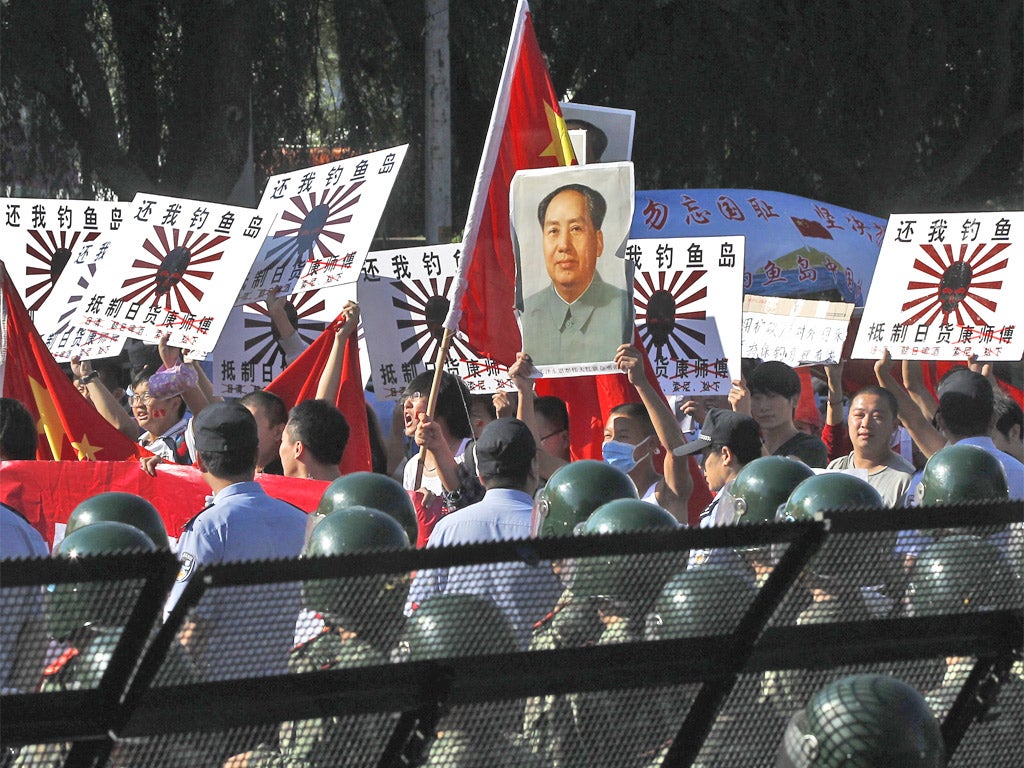
Your support helps us to tell the story
From reproductive rights to climate change to Big Tech, The Independent is on the ground when the story is developing. Whether it's investigating the financials of Elon Musk's pro-Trump PAC or producing our latest documentary, 'The A Word', which shines a light on the American women fighting for reproductive rights, we know how important it is to parse out the facts from the messaging.
At such a critical moment in US history, we need reporters on the ground. Your donation allows us to keep sending journalists to speak to both sides of the story.
The Independent is trusted by Americans across the entire political spectrum. And unlike many other quality news outlets, we choose not to lock Americans out of our reporting and analysis with paywalls. We believe quality journalism should be available to everyone, paid for by those who can afford it.
Your support makes all the difference.China and Japan are the world's second and third largest economies, and despite the historical grievances, business links are thriving. Trade between the two countries hit a record $345bn in 2011, a 14 per cent rise on 2010. About 140,000 Japanese live and work in China. Tourism is flourishing too. Only South Koreans visit Japan in greater numbers than the Chinese, while China is the most popular holiday destination for Japanese tourists.
By Clifford Coonan in Shanghai
Japanese expatriates stayed behind locked doors yesterday, as the anniversary of the start of the 1931 occupation prompted more angry Chinese to pour on to the streets to protest against Tokyo's recent purchase of an archipelago claimed by Beijing.
Shops, restaurants and factories with any ties to Tokyo were closed, as thousands of Chinese demonstrators filled the streets, smashing Japanese-made cars and vandalising sushi bars and other businesses.
Relations between Asia's two biggest economies have deteriorated since Japan's cabinet announced last week that it was purchasing an uninhabited group of islands in the East China Sea – known as the Senkaku in Japan and Diaoyu in China – from a private Japanese owner.
The deal revived deep historical grievances in China, which erupted again yesterday on the 81st anniversary of the Mukden incident, a railway bombing staged by Japan in 1931.
The incident was used as a pretext to invade Manchuria, setting off a brutal occupation of China that ended only at the close of the Second World War.
In China's financial capital, Shanghai, home to the country's biggest Japanese population, thousands of Chinese staged a demonstration outside the Japanese consulate, waving banners saying "Kill all Japanese" and "Destroy all the Japanese dogs". Shanghai's streets had emptied of the city's 56,000 Japanese residents. At the Japanese embassy in Beijing, protesters threw bottles and fruit, chanted anti-Japanese songs and demanded boycotts of Japanese goods. Some windows were smashed.
Beijing has given tacit approval to the protests but there are fears that they could get out of hand.
Many of the protesters have carried portraits of Chairman Mao Zedong, which is an implicit criticism of the current administration in China.
The Maoist demonstrators bore banners reading: "United, Love China, Never forget our national shame".
Join our commenting forum
Join thought-provoking conversations, follow other Independent readers and see their replies
Comments